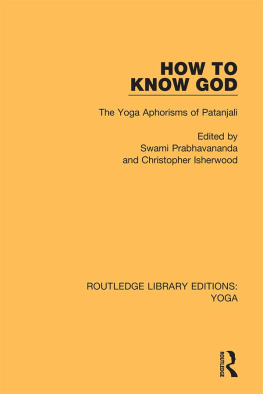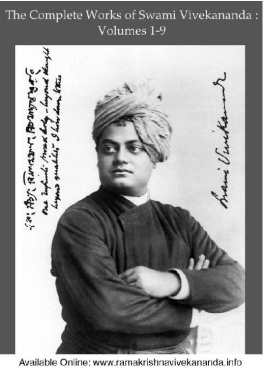Swami PrabhavanandaChristopher Isherwood - How to Know God
Here you can read online Swami PrabhavanandaChristopher Isherwood - How to Know God full text of the book (entire story) in english for free. Download pdf and epub, get meaning, cover and reviews about this ebook. year: 2018, publisher: Taylor & Francis (CAM), genre: Religion. Description of the work, (preface) as well as reviews are available. Best literature library LitArk.com created for fans of good reading and offers a wide selection of genres:
Romance novel
Science fiction
Adventure
Detective
Science
History
Home and family
Prose
Art
Politics
Computer
Non-fiction
Religion
Business
Children
Humor
Choose a favorite category and find really read worthwhile books. Enjoy immersion in the world of imagination, feel the emotions of the characters or learn something new for yourself, make an fascinating discovery.
- Book:How to Know God
- Author:
- Publisher:Taylor & Francis (CAM)
- Genre:
- Year:2018
- Rating:5 / 5
- Favourites:Add to favourites
- Your mark:
- 100
- 1
- 2
- 3
- 4
- 5
How to Know God: summary, description and annotation
We offer to read an annotation, description, summary or preface (depends on what the author of the book "How to Know God" wrote himself). If you haven't found the necessary information about the book — write in the comments, we will try to find it.
How to Know God — read online for free the complete book (whole text) full work
Below is the text of the book, divided by pages. System saving the place of the last page read, allows you to conveniently read the book "How to Know God" online for free, without having to search again every time where you left off. Put a bookmark, and you can go to the page where you finished reading at any time.
Font size:
Interval:
Bookmark:

SWAMI PRABHAVANANDA AND
CHRISTOPHER ISHERWOOD

by Routledge
2 Park Square, Milton Park, Abingdon, Oxon OX14 4RN
52 Vanderbilt Avenue, New York, NY 10017
A catalogue record for this book is available from the British Library
ISBN: 978-0-429-39773-8 (Set) (ebk)
ISBN: 978-0-367-02588-5 (Volume 2) (hbk)
ISBN: 978-0-429-39885-8 (Volume 2) (ebk)
The publisher has gone to great lengths to ensure the quality of this reprint but points out that some imperfections in the original copies may be apparent.
The publisher has made every effort to trace copyright holders and would welcome correspondence from those they have been unable to trace.

by Bradford & Dickens
London, W.C.1
Patanjalis Yoga Sutras (Aphorisms) are not the original exposition of a philosophy, but a work of compilation and reformulation. References to yoga practicesspiritual disciplines and techniques of meditation which enable a man to achieve unitive knowledge of the Godheadare to be found, already, in the Katha, Swetaswatara, Taittiriya, and Maitrayani Upanishads, very many centuries earlier. Indeed, the yoga doctrine may be said to have been handed down from prehistoric times.
What Patanjali did was to restate yoga philosophy and practice for the man of his own period. But what was his period? And who was Patanjali? Hardly anything is known about him. Some authorities believe that there were actually two Patanjalis, one a grammarian and the other the author of the Sutras. Others deny this. As for the date of the Sutras, the guesses of scholars vary widely, ranging from the fourth century B.C. to the fourth century A.D.
The simplest meaning of the word sutra is thread. A sutra is, so to speak, the bare thread of an exposition, the absolute minimum that is necessary to hold it together, unadorned by a single bead of elaboration. Only essential words are used. Often, there is no complete sentence-structure. There was a good reason for this method. Sutras were composed at a period when there were no books. The entire work had to be memorized, and so it had to be expressed as tersely as possible. Patanjalis Sutras, like all others, were intended to be expanded and explained. The ancient teachers would repeat an aphorism by heart and then proceed to amplify it with their own comments, for the benefit of their pupils. In some instances these comments, also, were memorized, transcribed at a later date, and thus preserved for us.
In this translation we have not only provided a commentary but expanded and paraphrased the aphorisms themselves, so that each one becomes an intelligible statement in the English language. Certain other translators have been unwilling to take this liberty, and have therefore offered a version of the text which is approximately literal, but as cryptic as a professors lecture notes. It cannot be understood at all until its commentary has been carefully studied. We believe that this kind of translation has a bad psychological effect on the reader. Being, at first glance, unable to make anything of the aphorisms themselves, he is apt to decide that the whole subject is too difficult for him. Enough difficulties exist anyway in the study of yoga philosophy. It has been our aim not to increase them unnecessarily.
Our commentary is mainly our own work. However, we have followed the explanations of the two ancient commentators, Bhoja and Vyasa. We have also quoted frequently from the brilliant and deeply intuitive comments of Swami Vivekananda. These comments were made extempore during the classes on Patanjali which the Swami held in the United States more than fifty years ago. They were written down by his students, and are included in his book on Raja Yoga.
Since yoga, prior to Patanjali, was originally grounded in Vedanta philosophy, we have interpreted the aphorisms, throughout, from a Vedantist viewpoint. In this we differ from Patanjali himself, who was a follower of Sankhya philosophy. But these are merely technical differences, and it is best not to insist on them too strongly, lest the reader become confused. They are briefly explained at appropriate points in our commentary.
In general, we have wished to present this book as a practical aid to the spiritual life; an aid that can be used by the devotees of any religion Hindu, Christian, or other. We have therefore avoided dwelling much on its metaphysical and occult aspects. The study of these may fascinate some types of mind, but it is ultimately sterile and may even be dangerous if carried to excess.
It was suggested to us, while we were working on the book, that we should introduce into it a comparison of yoga and modern Western psychology. Such a comparison has already been attempted by various writers, and some interesting points of similarity and dissimilarity in theory and technique have been noted. But, from our point of view at least, the comparison in itself seems neither fair nor valid. Yoga psychology is a finished product. Western psychology is still developing, and along several divergent lines ; continually producing new theories and discarding old ones. If one says categorically: Western psychology holds this view... one is always in danger of being reprimanded for inaccuracy.
Font size:
Interval:
Bookmark:
Similar books «How to Know God»
Look at similar books to How to Know God. We have selected literature similar in name and meaning in the hope of providing readers with more options to find new, interesting, not yet read works.
Discussion, reviews of the book How to Know God and just readers' own opinions. Leave your comments, write what you think about the work, its meaning or the main characters. Specify what exactly you liked and what you didn't like, and why you think so.











